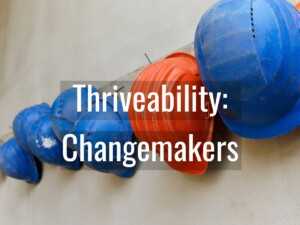Can tourism destinations-as-communities be better & smarter by design?

What does it mean to collaboratively design tourism at the community level? And to what end? If it is to strive towards a ‘good’, ‘better’, ‘smarter’ tourism, what does that look like? Retired university professor K Michael Haywood shares his vision.
It’s a “Good Tourism” Insight.
[Thanks to Jim Butcher for inviting Prof Haywood to write a “GT” Insight.]
Astonish … Captivate … Dazzle … Awe … Thrill … Astound … Surprise … Amaze … Gratify … Mystify … Enrich … Inspire … Fascinate … Beguile … Educate … Enchant …
Explicitly or implicitly, and in their own inimitable ways, these are the promises all destinations and visitor-serving enterprises attempt to honour. Yet, honestly, how well do they reveal the achievement of our aspirations for ‘good tourism’ or ‘conscious travel’?
Has our collective obsession with gaining attention, and the untold expenditures on marketing and branding, created new awareness, or a need for changes in behaviour?
Has our exclusive focus on sustainability led us astray by ignoring its connectivity and relationship with an assembly of other urgent interwoven concerns?
Are the crises and urgencies associated with pandemic recovery forestalling the attention our leaders, managers, and policy-makers should be giving to more pressing, apocalyptic issues and futures, and more purposeful rationales for tourism?
Also see Larry Dwyer’s “GT” Insight
“Tourism & hosts’ well-being: Moving beyond GDP towards a better life”
While many people have debated these and similar questions for decades, in some respects the pandemic has come to represent a key tipping or inflection point, signalling the possibility for an abrupt change to the status quo.
We’re at a point when more people are questioning how tourism should be conceptualised: What is its purpose within our communities-as-destinations? What is the meaning, creation, and manifestation of tourism’s ‘value’ and ‘growth’?
If there is indeed heartfelt intent to build back better in community-inclusive ways, how should value and growth be determined and measured?
For years we have been attentive to the sustainability concerns of our communities, countries, and planet. But so profound and determinate are the converging urgencies of climate change, health, and justice — social, environmental, and economic — that a growing number of industry insiders are finally wondering how best to respond.
As community stakeholders contemplate how tourism can lead regenerative initiatives, how do industry stakeholders take meaningful and collective action?
Also see Loretta Bellato’s “GT” Insight
“Is ‘regenerative tourism’ just a rebranding of ‘sustainable tourism’?”
We are all fully aware that the status quo and stall points continue to persist. Most conspicuous is our obsession with competitiveness. Everyone wants to increase the number of seasonal visitors and maximise their expenditures so that communities can generate greater tax revenues and more jobs, and businesses can boost revenues.
As an effective spur to economic growth, tourism development has always held sway and been pursued with panache, quite often without comprehensive consideration as to its desirability, viability, sustainability, or substantiality. Most worrisome is tourism development that is inconsiderate of the corresponding and complementary need for social and cultural development and social and cultural innovation.
Witness the current priority individual enterprises and industry associations feel compelled to focus on to overcome the obstacles associated with transitioning to a restart: Momentous concerns about getting tourism-related jobs back.
Also see Peter Richards’ “GT” Insight
“A community’s dilemma: COVID’s ‘new normal’ vs ‘back to normal’”
This is a complex attrition problem that will require new insights as to how the travel, tourism, and hospitality sectors can regain their attractiveness (some might say their soul). Given shifting stakeholder demands and expectations, this will have to be manifest in many different ways.
Those of us with firsthand experience can attest that this quest to regain the ability to ‘astonish’, ‘dazzle’, ‘beguile’, etc., won’t be easy. The performativity required between hosts and guests, places and people has always caused headaches.
They will be especially painful for those beleaguered operators on the front lines who grapple with the perpetual conundrum: “How do you expect us to look ahead when we barely have a chance to look up?”
Community-based tourism, community-based design
It’s all well and good to posit the need for change and improvements as “post-capitalist interventions”, but if meaningful change is to take place we cannot expect it to be enacted from on high. It needs to be articulated, discussed, demonstrated, and negotiated at local levels, and at more appropriate levels of abstraction.
Those who operate, willingly or unwittingly, on the front lines — employers, employees, and residents of communities — are the important ‘change agents’. They need to understand and appreciate the need for meaningful change.
Also see Raoul V Bianchi’s “GT” Insight
“Tourism, capitalism, & the coronavirus crisis: What is to be (un)done?”
Working from the premise that we are dealing with communities-as-destinations in search of breakthrough ideas and innovations, desirous also of choosing their own destinies, no-one expects these breakthroughs to emerge by chance. Nor will they be formed in the minds of geniuses.
Indeed, the challenges faced by communities are complex and exist within complex systems. To be addressed and resolved locally or regionally, they have to be fully embraced and understood in relation to one another.
Whatever solutions are finally determined, inevitably they will be realised through peoples’ honest-to-goodness aspirations, their collective will, and their willingness to be bold and inventive through well-conceived design-thinking processes.
Rather than explain and pontificate as to what is meant by and through design, take a few minutes to listen as Tim Brown — particularly from about 12:55 in the embedded video — discusses how design thinking allows people and communities to “think big”:
The approach he describes is human-centred. It pays particular attention to context and culture. It requires learning-by-making, or prototyping. It actively engages everyone in a community. And it arrives at a new range of choices, alternatives, ideas, and potential solutions.
On that last point, consider what Harold Nelson says about community-based design:
Communities that are intent on taking responsibility to identify, study, and resolve their own problems can do so through observation, testing, iteration, and learning.
Community-driven approaches to tourism design and development are unlikely to happen unless there is confidence and trust. That takes time.
Any expressed desire to co-operate, collaborate, and co-create with a community must be revealed over time to be honest, self-evident, and on-going, especially if initiated by an unknown outsider or ‘authority’.
Community participants must feel that they belong. They must feel that they are listened to, especially when they impart ‘inconvenient truths’.
Also see Peter Richards’ “GT” Insight
“And the most important colleagues in a community-based project are …”
Harkening back to the concepts of ‘growth’ and ‘value’, a well-informed community will be quick to note the misdirection lurking in the commonly-accepted measures of these concepts. Annual sales or revenues, market share, asset prices, and other metrics expressed in terms of money belie more qualitative notions of value, worth, advancement, stagnation, or decline.
Growth, for example, will never be ‘healthy’ so long as tourism activates and energises inherent conflicts among stakeholder groups, especially if they sow discord. After all, growth has consequences beyond the production of wealth; consequences that extend both inward and outward, affecting lives, livelihoods, and other forms of ‘wellth’.
In terms of generating value, it is interesting to note Bain and Company’s characterisation of value’s fundamental elements and their placement into a hierarchy:

Goods, services, places, and experiences that serve higher-order emotional, social, and life-affirming needs are more valuable to a customer that those that simply meet functional requirements.
In tourism, value has traditionally been expressed in terms of numbers that are important to governments, sectors, and organisations — aggregate arrivals, occupancy rates, and expenditure, for example — rather than in ways that reflect the values of other stakeholders, both human and natural.
It should be obvious, but is worth noting, that most decisions associated with tourism are made at the micro level, within the rules laid down by economic, legal, and political policy. Whatever growth, stagnation, or disaster occurs, it is invariably a product of the insights of strategists, marketers, managers, and investors, grounded by the constraints of social structure and chance.
Also see Chris Flynn’s “GT” Insight
“The cause of overtourism & how tourism can avoid choking on success”
Now we are witnessing our collective passage into a watershed moment of historical proportions. No longer can we simply muddle through, especially when our choices come down to collective decisions that need to be translated into political action.
Indeed, the issues we face represent moral and ethical priorities, as well as clashes of competitive interests.
Now, more than ever, the questions we should ask of ourselves and others are:
What is the right thing to do?
What do we truly want?
‘Salus populi suprema lex esto’
As the Nobel laureate Edmund Phelps proposed, we need to aim for a (more progressive) version of “mass flourishing”.
From the perspective of travel & tourism, this means that we should aim to deliver various forms of magnificence while ending all the forms of mediocrity and misery that characterise so many of our tourism experiences today.
How?
To my mind, it requires approaches that are smarter by design.
We briefly looked at community-based design, which is preferable in the travel & tourism context. What does it mean to be ‘smarter’?
If we are to craft our future so that it can be ambitiously transformational and transcendent in an age of continuous connection and change, ‘smarter’ has to address conformity and our “connected but alone” mentalities.
It will probably require the application of different learning techniques to re-build strong communities from the bottom up, including destination assessments and strategies for sustainable community planning.
‘Smarter’ design will lead to the development of collaborative advantage through a more caring people-centred approach, encouraging creativity, and developing capability; being transparent and trustworthy; unlocking and improving communities’ common wealth and “wellth” through purpose-led innovation; and investing our way into new economies that create more just value for all.
‘Smarter’ has to be about socially-relevant tourism that recognises the importance of collective impact and influence, building strength-based cultures, and protecting living cultures so as to deal with tourism’s internalities and externalities.
Also see Kristin Dunne’s “GT” Insight
“Planning tourism with purpose & love in New Zealand’s Bay of Plenty”
Communities are shaped by market (behavioural) forces, of course. As such, communities-as-destinations have to approach the market in a ‘smarter’ way, as — place-by-place, season-by-season — they remain compelling by virtue of their authenticity: Their hospitality warm and inspiring, their sustainability comprehensive, their attractions and activities innovative, their agendas creative and collaborative, and the value they create captured more fully and shared more equitably.
A smart transformation will require strategies and social contracts within communities that are more precise than those articulated by the Business Roundtable.
In a way ‘smarter’ is about being responsible by taking responsibility, demanding a re-think of planning processes, and sharing power if one has it. As such, being ‘smarter’ requires that everyone develop the habits and capabilities to become architects of human value via a search for greatness.
As an individual, one should strive to become invaluable within one’s community: Foster community resilience; demand adaptation, economic diversification, and social citizenship (not only economic opportunity); and be instrumental in advancing social progress, well-being, and cultural evolution.
‘Smarter’ is said to be technology-driven. But while the “5G cities of tomorrow” and the digital economy may change travel & tourism and their business models as we now know them, ‘smarter’ destinations cannot progress without government support, the involvement of intelligent people, and the dynamic capabilities of organisations or their leaders asking good questions, participating in serious play, and willing to take small risks to enhance their luck.
All should be concerned about the overall development of human, social, cultural, and natural capital. And we should ensure that it is deployed within inclusive and networked infrastructures that enable the lifestyles desired by many; lifestyles accentuated by sharing not scarcity, such as Amsterdam Sharing City, as well as by technologies designed to be people-centric and people-driven.
Also see Tim O’Donoghue’s “GT” Insight
“Two democratisation challenges to consider as we plan for recovery”
‘Smarter’ requires that we inspire people to be aspirational towards ends that are both appropriate and realisable. What’s at stake is not just finding strategic leaders, or developing them, but being better at recognising the role of travel & tourism in all people’s lives, such as: Determining when education and training is appropriate at different stages; calling upon peoples’ entrepreneurial potential at other stages; and attracting and developing the best candidates at any stage because travel & tourism’s work experiences are more meaningful and productive than they are now.
‘Smarter’ is when all visitor-serving organisations and communities-as-destinations realise that sustained operational success for one is influenced by, and hinges upon, the success of all. Value is best created, captured, and shared when there are high-quality relationships within communities and throughout industry clusters.
As in other industries, such as agriculture, this will necessitate business models, strategies, policies, and narratives that encourage civic grace and responsibility, inclusivity, and relevance for all stakeholders. These are particularly needed to address the issues, uncertainties, and (some extreme) risks involving cultural heritage, stewardship, social justice, and environmental, social and corporate governance.
‘Smarter’ is demonstrated when communities-as-destinations become known for the quality of their civil societies; their nimbleness, ingenuity, and generosity; their ability to connect design to communities; and their culture of co-creating, sharing, and integrating value, knowledge, ethics, intellectual capital, and innovation.
For improving regional and local prosperity, and the well-being and quality-of-life of people, ‘smarter’ should be about citizens, stakeholder governance, leadership, the management of travel & tourism clusters, and how well change is communicated.
‘Smarter’ is revealed when people actually believe you when you say “lean on me”; and, when everyone demonstrates the kindness inherent in humankind.
If we are to “treat people with kindness”, then salus populi suprema lex esto; the welfare of the people has to be the supreme law.
Tourism can only be ‘good’ by design
The ability to generate outcomes that astonish, captivate, dazzle, awe, etc., will be achieved when, collectively, we make concerted efforts to embrace all aspects of what one may consider to be ‘good tourism’.
This may take a while since being and becoming ‘good’ across multiple dimensions requires becoming ‘smarter’. And ‘smarter’ has to be designed.
It has to be designed because it’s about exploring different possibilities; recognising and dealing with relationships and their constraints; focusing on fundamental human needs; allowing for serendipity, improvisation, unpredictability, and the capricious whims of fate; and it requires people with the capacity and disposition for collaboration across disciplines.
Few communities-as-destinations have fashioned approaches and developed and enacted strategies to achieve the composite of attributes and behaviours that I would think ‘good tourism’ represents.
Smarter by design seeks intentional, transformational change in an unpredictable world in which a community’s resultant actions have the best chance to lead to desirable and appropriate outcomes.
The collaborative design process, which is not fully explained in this post, integrates reason with observation, reflection, imagination, and action. It is a consequence of necessity and chance.
Being community-driven means that it will never be easy.
But it will always be highly rewarding.
What do you think? Share a short anecdote or comment below. Or write a deeper “GT” Insight. The “Good Tourism” Blog welcomes diversity of opinion and perspective about travel & tourism because travel & tourism is everyone’s business.
Featured image (top of post): Can destinations-as-communities be better & smarter by design? Image by Gerd Altmann (CC0) via Pixabay.
About the author

K Michael Haywood is Professor Emeritus, School of Hospitality, Food and Tourism at the University of Guelph in Ontario, Canada. Find him on LinkedIn.





